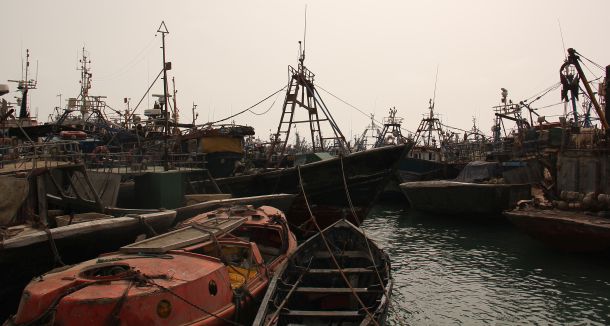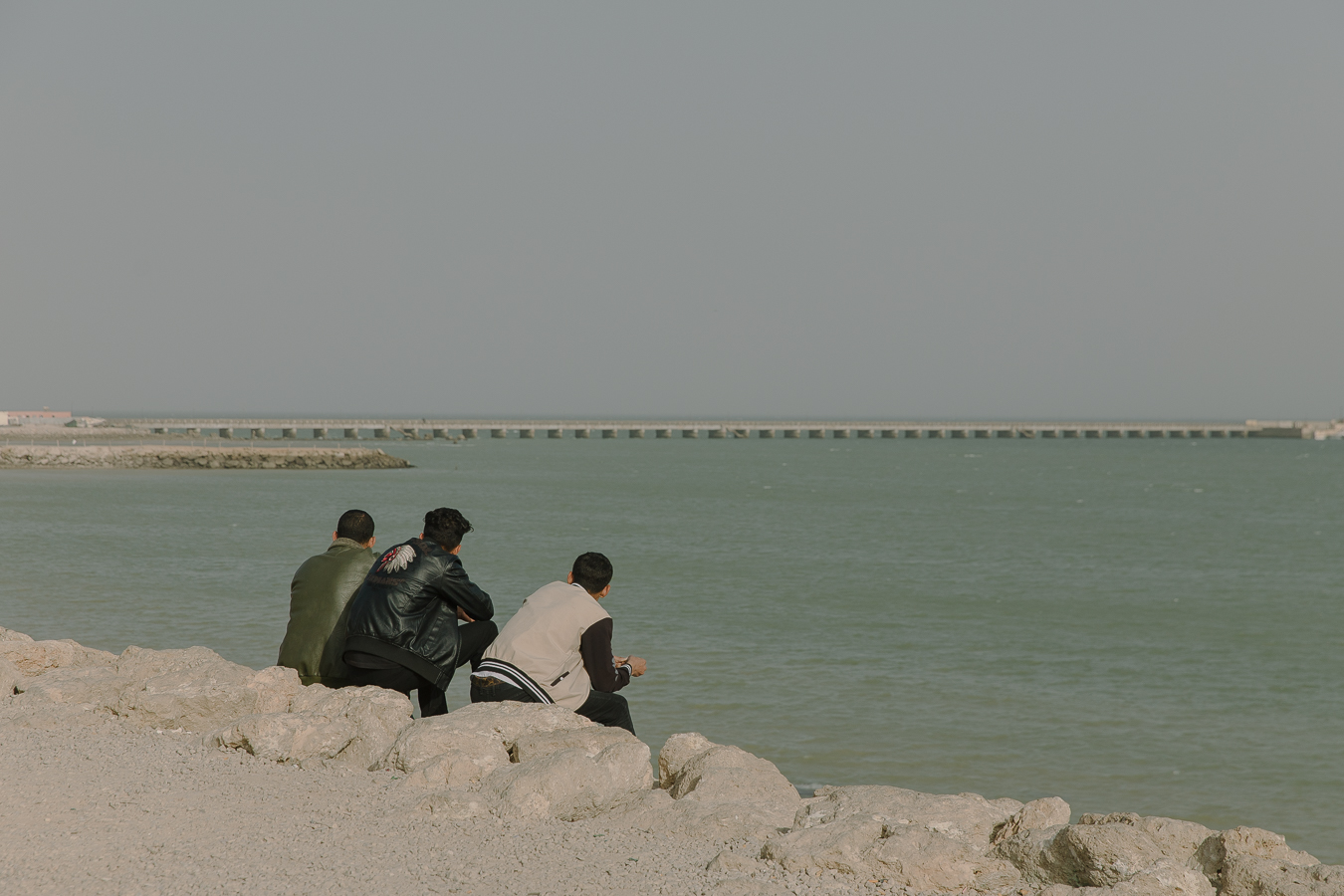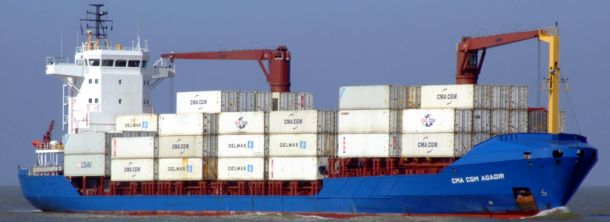
The two Spanish companies that are exporting practically all petroleum into occupied Western Sahara remain non-communicative.
Caption: The tanker Med Blue Jay observed picking up cargo from Cepsa in Carteya Guadarranque near Gibraltar, in February 2023.
The Spanish oil companies Cepsa and Repsol account for at least 84% of all petroleum products that arrived in occupied Western Sahara during the calendar year 2023.
Western Sahara Resource Watch (WSRW) has analysed 114 petroleum-carrying voyages into the territory last year. Nearly all the oil came from Spain, the rest coming in from ports in Morocco (9,35% of total) as well as one single cargo (around 2%) from Bulgaria.
WSRW estimates the volume to be half a million tonnes, almost identical to previous years.
The calculation for that amount is based on the travel routes of 23 different vessels that are highly likely to have transported such cargo into the territory during that year. The vessels stopped a total of 83 times in the port of El Aaiún and 74 times in the port or anchorage area of Dakhla. Some of the import incidents included calls into both two ports.
Petroleum products are essential for Morocco to maintain its occupation of the territory. The petroleum products arriving in Western Sahara serve primarily to fuel vehicles, engines and vessels that take part in the illegal plunder of the territory, or are used for military purposes by the Moroccan army.
The total quantity of oil transported into occupied Western Sahara during 2023 is estimated at 505,000 tonnes. The calculation is based on the size of each vessel and its shipment route. In addition, the changes in draught have been taken into account. A draught explains the distance from the waterline down to the bottom of the vessel, and changes in this distance explain whether a vessel is discharging or loading.
WSRW asked Cepsa to comment on the shipments in a letter in 2022. The company responded that “we supply hydrocarbons for distribution in the Saharawi territory, which are fully permitted”. The company noted to WSRW that “we are not commenting further”, when asked which country's laws and institutions they referred to. WSRW has also written to Cepsa in 2014, 2017 and 2018. A short response from the company on 8 November 2018 failed to answer the questions on that same point.
WSRW wrote to Repsol on 21 February 2022. The letter was not responded to.
The volume of petroleum products shipped into Western Sahara in 2023 is similar to the one that WSRW observed for the years 2022, 2021 and 2020, but lower from what WSRW reported for 2019. The decrease from 2019 to 2020 is most likely due to a more conservative WSRW methodology for calculating cargo aboard the vessels, applied from the year 2020 onwards.
As in previous years, the most involved shipping company, by far, is the French company Sogestran, controlling the tanker Mayoury. In 2023, the company accounted for 21,6% of all petroleum shipped into the territory. The company has not responded to any WSRW/APSO letters since 2017, including letters from 2020 and 2022.
2023 was the first year recorded since 2010 without the participation of a single Swedish-Norwegian transport. The Swedish-Norwegian trade used to be rather big, and was subject to WSRW’s report Fuelling the Occupation in 2014.
In 2023, a new Moroccan tanker, Challah (IMO 9933913) was put to use. The ship was constructed in 2022 and is of the same size as the large ship Mayoury. Its first voyage to the occupied territory was observed on 22 January 2023.
In 2024, the Mayoury was sold to what is most likely Moroccan interests and shifted flag to Malta. This trend follows the earlier Moroccan take-overs of the Swedish owned and Norwegian-flagged Wisby fleet, as reported on earlier. As a consequence, Moroccan interests are increasingly controlling the fleet that fuels the occupation.

It is possible that the overview presented here is not complete, and that certain arrivals have escaped WSRW’s attention. There might be certain inaccuracies in the calculation of the cargo of certain ships that fuel the Russian fisheries fleet offshore Western Sahara, as draughts are sometimes reported poorly or incoherently.
WSRW believes that Repsol accounted for 55,7 percent of the total volume (exported from its refineries in the port of Cartagena Escombreras), and that Cepsa accounted for 28,7% of the total (from the ports of Carteya Guadarranque, Huelva and Tenerife). In 2022, the two companies accounted for approximately the same export volume. Repsol's involvement is thus deemed a lot more important than that of Cepsa.
It is somewhat unclear to WSRW which exporting companies are likely behind the exports from Las Palmas and Algéciras in Spain, Jorf Lasfar and Tanger in Morocco. The exports in Varna in Bulgaria came from the oil terminal of Bulgarian company Naftex Petrol.
The 23 petroleum tankers involved in the transports for the calendar year 2023 are: Argan, Atlantis Alicante, B. Atlantic, B.Sun, Bice Amoretti, Cathy Theresa, Cedar, Challah, Etrusco, Ft Sturla, Ginostra M, Karpathos, Kassos, Lamentin, Mayoury, Med Baltic, Med Blue Jay, Med Emre, Mt Bandirma, Nivar, River Oak, Tingis and Vs Salma.
The tankers fly the following flags: Malta (7), Morocco (4), Marshall Islands (3), Italy (3), Cyprus (2), Denmark (1), France (1), Panama (1) and Turkey (1)
WSRW has made a similar overview of petroleum exports for the calendar years 2022, 2021, 2020 and 2019.
Since you're here....
WSRW’s work is being read and used more than ever. We work totally independently and to a large extent voluntarily. Our work takes time, dedication and diligence. But we do it because we believe it matters – and we hope you do too. We look for more monthly donors to support our work. If you'd like to contribute to our work – 3€, 5€, 8€ monthly… what you can spare – the future of WSRW would be much more secure. You can set up a monthly donation to WSRW quickly here.
First overview of gas imports into occupied Western Sahara
50,000 tonnes of liquified gas arrived in occupied Western Sahara last year, according to our first overview of this key trade.
New controversial energy infrastructure to be built in Western Sahara
The Moroccan government has opened for a relatively large tender in Dakhla.
Canary trade mission to legal minefield
A publicly organised mission will take Canary companies into occupied Western Sahara later this month.
Controversial container route has opened
And another vessel is on its way.



